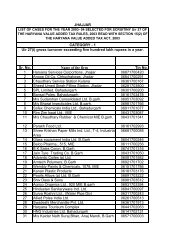Order of clarification under section 56(3) of HVAT ... - Haryanatax.com
Order of clarification under section 56(3) of HVAT ... - Haryanatax.com
Order of clarification under section 56(3) of HVAT ... - Haryanatax.com
- No tags were found...
You also want an ePaper? Increase the reach of your titles
YUMPU automatically turns print PDFs into web optimized ePapers that Google loves.
<strong>Order</strong> <strong>of</strong> <strong>clarification</strong> <strong>under</strong> <strong>section</strong> <strong>56</strong>(3) <strong>of</strong> <strong>HVAT</strong> Act, 2003 on the application <strong>of</strong>Manufacturers Association, Faridabad.This is an order <strong>of</strong> <strong>clarification</strong> <strong>under</strong> <strong>section</strong> <strong>56</strong>(3) <strong>of</strong> the Haryana Value Added TaxAct, 2003 (VAT Act) on the application <strong>of</strong> Manufacturers Association, Faridabad seeking<strong>clarification</strong> whether a spring leaf is covered <strong>under</strong> sub-clause (iv) <strong>of</strong> Section 14 <strong>of</strong> theCentral Sales Tax Act, 19<strong>56</strong> and taxable as declared goods <strong>under</strong> VAT Act.2. The circumstances envisaged by the applicant and the points on which the <strong>clarification</strong>has been sought are as follow:-(i) Leaf spring assemblies: There is no dispute about the <strong>clarification</strong> and rate <strong>of</strong>taxation with regard to leaf spring assemblies. A leaf spring assembly is admittedto be a ‘motor vehicle part’ as are used by vehicle manufacturers, the originalequipments manufacturer (OEM).(ii) Loose Spring Leaves: The present dispute is on account <strong>of</strong> classification <strong>of</strong>loose spring leaves. In State <strong>of</strong> Haryana ‘Loose Spring Leaves’ are taxed asMotor Vehicle parts, whereas in other States like U.P., M.P. and Maharashtra,loose spring leaves are classified <strong>under</strong> as ‘iron and steel’ placed in the category<strong>of</strong> declared goods <strong>under</strong> <strong>section</strong> 14 <strong>of</strong> the CST Act.It has also been stated that with regard to classification <strong>of</strong> loose spring leaves,the Apex Court, High Courts, Tribunals and various State Governments have heldthat loose spring leaves are nothing, but iron and steel and as such these aredeclared goods and leviable to tax as a declared goods at 4%.3. This issue sought to be clarified involves interpretation <strong>of</strong> entry 42 in notificationS.O.50/H.A. 6/2003/S.7/2003 dated 1 st April, 2003. (as substituted with effect from 1 stApril 2003 vide S.O.92 dated 8.7.2003). This entry includes ‘<strong>com</strong>ponents, spare parts andaccessories <strong>of</strong> motor vehicles mentioned therein.4. There cannot possibly be any serious dispute that in <strong>com</strong>mon parlance <strong>com</strong>ponentsare items or parts which are used in the manufacture <strong>of</strong> the final product and withoutwhich final product cannot be conceived <strong>of</strong>. Spare parts are those <strong>com</strong>ponent parts which,in the course <strong>of</strong> use, wear and tear out frequently and are, therefore, required to be kept inreadiness for use as and when necessary. As <strong>com</strong>ponent or spare parts have not been
defined <strong>under</strong> VAT Act, a reference may usefully be made in this context to the plaindictionary meaning <strong>of</strong> these expressions as per the Shorter Oxford English Dictionary:“‘Component’: Composing, making up, constituent, a constituent part or element.'Spare': Not in actual or regular use at the time spoken <strong>of</strong>, but carried, held or keptin reserve for future use or to supply on emergency; additional, extra, that can bespared, dispensed with or given away, as being in excess <strong>of</strong> actual requirements,superfluous."5. The expression "<strong>com</strong>ponent" came up for consideration before Bombay High Courtin Commissioner <strong>of</strong> Sales Tax v. Jayanand Khira & Co. Private Ltd. [1975] 36 STC 242.It was held:"that in order to determine whether a particular article is a <strong>com</strong>ponent part <strong>of</strong>another article, the correct test would be to look both at the article which is said tobe the <strong>com</strong>ponent part and the <strong>com</strong>pleted article and then <strong>com</strong>e to the conclusionwhether the first article is a <strong>com</strong>ponent part <strong>of</strong> the whole or not. If one were tolook at a <strong>com</strong>plete and finished product, one might find so many parts which, bybeing fixed or otherwise made part <strong>of</strong> the said product, would lead one into afallacious impression that they are <strong>com</strong>ponent parts. One must first look at thearticle itself and consider what its uses are and whether its only use or itsprimary or ordinary use is as the <strong>com</strong>ponent part <strong>of</strong> another article."6. In the case reported as [1990] 078 STC 0079 Commissioner <strong>of</strong> Sales Tax,Maharashtra State, Bombay Vs. Acme Mfg. Co. Ltd, one <strong>of</strong> the question before BombayHigh Court was whether valves can be said to be <strong>com</strong>ponent <strong>of</strong> trucks. Valves are<strong>com</strong>ponents <strong>of</strong> diesel engines and diesel engines are <strong>com</strong>ponents <strong>of</strong> the trucks. In otherwords the question was whether a <strong>com</strong>ponent <strong>of</strong> a <strong>com</strong>ponent <strong>of</strong> motor vehicle shall alsobe the <strong>com</strong>ponent <strong>of</strong> motor vehicle. The court held that valves would be <strong>com</strong>ponents <strong>of</strong>motor vehicle.
7. It is relevant in the context that valves are used in diesel engines which are supplied tomanufacturer <strong>of</strong> motor vehicle (OEM). A user <strong>of</strong> motor vehicle, after wear and tear <strong>of</strong>engines gets it overhauled and in that process valves in an engine are replaced in aworkshop. In the instant case “spring leaves assembly” is admitted by applicant ascovered <strong>under</strong> entry 42 as a <strong>com</strong>ponent <strong>of</strong> motor vehicles. A ‘spring leaves assembly’ ismade <strong>of</strong> a number <strong>of</strong> spring leaves bunched together. Usually, it is sold to manufacturersfor fitting with the chassis <strong>of</strong> motor vehicles. While using the motor vehicles some <strong>of</strong> theleaves get broken or after longer use and also due to excess load gets deflated. In sucheventualities, some <strong>of</strong> the leaves are replaced in the assembly. The leaves that arereplaced are available in market as loose spring leaves. As such, loose springs leave beingthe <strong>com</strong>ponent <strong>of</strong> ‘spring leaves assembly’ is also a <strong>com</strong>ponent <strong>of</strong> motor vehicle and istaxable <strong>under</strong> entry 42. (Applicant claim, that spring leaves assembly is used in motorvehicle and is a <strong>com</strong>ponent <strong>of</strong> motor vehicle).8. The main decision enclosed with the application <strong>under</strong> consideration [Unik Spring(India) Faridabad decided by the CUSTOM, EXCISE AND GOLD (CONTROL)APPELLATE TRIBUNAL] is about the levy <strong>of</strong> excise duty on job work <strong>of</strong> convertingiron and steel flats into loose spring leaves. This case specifically deals with the issue <strong>of</strong>exemption <strong>of</strong> job worker from payment <strong>of</strong> excise duty <strong>under</strong> a notification No 119/75 <strong>of</strong>central excise department. The board has decided in favor <strong>of</strong> the taxpayer with theobservation;“The reason for this is that we find that there is not a <strong>com</strong>pleteconversion <strong>of</strong> the goods originally received to the extent where such goods might<strong>com</strong>pletely lose their identity”. While considering this decision, it is to be kept in viewthat the incidence <strong>of</strong> tax there was an act <strong>of</strong> manufacturing whereas the act <strong>of</strong> sale is theincidence here. The basis <strong>of</strong> taxation <strong>under</strong> VAT Act is ‘different <strong>com</strong>mercial<strong>com</strong>modity’ whereas the basis for excise duty is’ manufacture <strong>of</strong> different <strong>com</strong>modity’.For tax purpose <strong>under</strong> VAT Act, cotton and surgical cotton are different <strong>com</strong>mercial<strong>com</strong>modity even though there is no loss whatsoever to the identity <strong>of</strong> cotton. A job work<strong>of</strong> converting cotton into surgical cotton may not attract excise duty on the basis laiddown by the Board in case supra, nonetheless sales tax would be leviable on cotton aswell as surgical cotton. Coming to the facts <strong>of</strong> case <strong>under</strong> consideration, we would tax
iron and steel flats as well as loose spring leaves; both being different <strong>com</strong>mercial<strong>com</strong>modity. A spring leave when bunched in ‘spring leaves assembly’ and a ’loose springleave’ used to replace a broken/deflated spring leave in that assembly how could not beperceived differently? Applicant has very candidly admitted in last sentence <strong>of</strong> Para 4 <strong>of</strong>the application that loose leaves springs are part <strong>of</strong> spring leave assembly.9. The applicant has pleaded that a loose leaf spring should be considered as declaredgoods being covered by entry <strong>of</strong> Iron and Steel. Their contention in this regard is that rawmaterial is spring steel bars and no different <strong>com</strong>mercial <strong>com</strong>modity emerges as a result<strong>of</strong> manufacturing process that involves cutting, drilling, blending, heating, hardening andtempering. Reliance has been placed on 74STC176 (SC), 23 STC 288(Guj) and 45 STC99(J&K).The latter two decisions were approved by Supreme Court in 74 STC 176. It hasbeen further contended that Maharashtara, Madhya Pradesh and U.P treat loose springleaf as covered <strong>under</strong> Iron & Steel and tax sales as the sale <strong>of</strong> declared goods. Copies <strong>of</strong>circulars issued by these States have also been enclosed (these copies are illegible andcould not be <strong>com</strong>mented).10. In 74 STC 176, the Apex Court held that galvanized steel tube is not different<strong>com</strong>mercial <strong>com</strong>modity from steel tube. The process <strong>of</strong> galvanizing <strong>of</strong> steel tube does notbring a different <strong>com</strong>mercial <strong>com</strong>modity in existence than the steel tube. The Apex Courtobserved that the purpose <strong>of</strong> galvanizing a pipe is merely to make it whether-pro<strong>of</strong>. Itremains a steel tube. In 45 STC 0099 J&K High Court held that galvanized iron sheetsare forms <strong>of</strong> iron and not iron goods. So far as galvanization is concerned it is performedto prevent iron from rusting and to enhance its life. Obviously no different <strong>com</strong>mercial<strong>com</strong>modity emerges by process <strong>of</strong> galvanization. In 23 STC288, Gujrat High Court heldthat corrugated sheet remains the item <strong>of</strong> iron and steel. There is contrary decision fromAllahabad High Court wherein perforated sheet were held to be different <strong>com</strong>mercial<strong>com</strong>modity; [48 STC 378(All)]. Rajasthan High Court in a case reported as 65 STC 215has held that corrugated sheet is different <strong>com</strong>mercial <strong>com</strong>modity than the steel sheet. Itis also pertinent that the decision <strong>of</strong> Allahabad High Court was not referred to beforeApex Court in the case supra whereas that <strong>of</strong> Gujrat High Court was referred and
approved. Perforation/ corrugation <strong>of</strong> a plain iron sheet are a case where different<strong>com</strong>mercial <strong>com</strong>modity should emerge.11. The most relevant is the view taken by Apex Court in Sate <strong>of</strong> Tamilnadu vs. PyareLal Malhotra, 37 STC 319 (SC). It was observed that the object <strong>of</strong> single point taxation isa <strong>com</strong>mercial <strong>com</strong>modity and not the substance out <strong>of</strong> which it is made. Such <strong>com</strong>mercial<strong>com</strong>modity here be<strong>com</strong>es a separate object <strong>of</strong> taxation in a series <strong>of</strong> sales <strong>of</strong> that<strong>com</strong>mercial <strong>com</strong>modity so long as it retains its identity as that <strong>com</strong>modity. It has furtherbeen observed (Para 10):"As we all know, sales tax law is intended to tax sales <strong>of</strong> different<strong>com</strong>mercial <strong>com</strong>modities and not to tax the production or manufacture <strong>of</strong>particular substances out <strong>of</strong> which these <strong>com</strong>modities may have beenmade. As soon as separate <strong>com</strong>mercial <strong>com</strong>modities emerge or <strong>com</strong>e intoexistence, they be<strong>com</strong>e separately taxable goods or entities for purposes<strong>of</strong> sales tax. Where <strong>com</strong>mercial goods, without change <strong>of</strong> their identity assuch goods, are merely subjected to some processing or finishing or aremerely joined together, they may remain <strong>com</strong>mercially the goods whichcannot be taxed again, in a series <strong>of</strong> sales, so long as they retain theiridentity as goods <strong>of</strong> a particular type."12. To my mind, leaf springs are different <strong>com</strong>mercial <strong>com</strong>modity than the spring steelbars/flat that is the basic raw material for leaf spring. No rationale exists in admittingloose leaf spring as declared goods being covered <strong>under</strong> sub-clause (iv) <strong>of</strong> clause (iv) <strong>of</strong><strong>section</strong> 14 <strong>of</strong> CST Act and taxing bunched/clipped leaves springs as <strong>com</strong>ponents <strong>of</strong>motor vehicle.13. I, therefore, conclude that ‘loose leaf springs’ are different <strong>com</strong>mercial <strong>com</strong>moditythan the Spring Steel bars or flat. Hence, loose springs can not be covered vide sub-clause
(iv) <strong>of</strong> clause (iv) <strong>of</strong> Section 14 <strong>of</strong> the Central Sales Tax Act and consequently would nottaxable as declared goods.This <strong>clarification</strong> shall be uploaded on the <strong>of</strong>ficial website.Dated: 10/12/2004(L.S.M.Salins)Financial Commissioner and Principal Secretary toGovernment Haryana, Excise and Taxation Department.



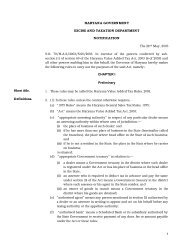
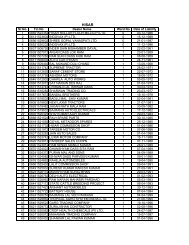
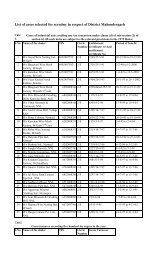
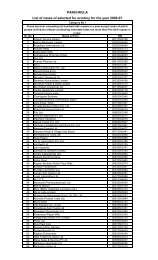
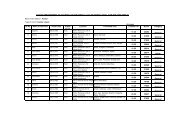
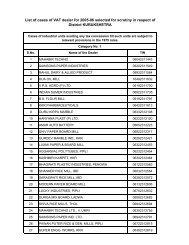
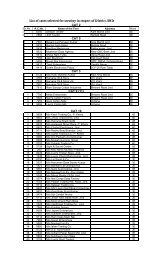
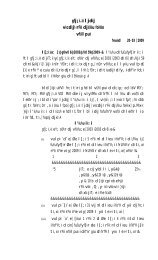
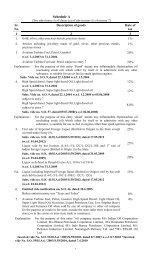
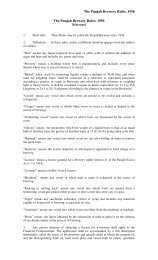
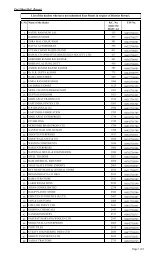

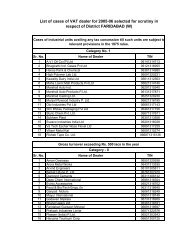
![FORM VAT â B1 Indemnity Bond [See rule 17(9) ] Know all men by ...](https://img.yumpu.com/49823656/1/158x260/form-vat-a-b1-indemnity-bond-see-rule-179-know-all-men-by-.jpg?quality=85)
